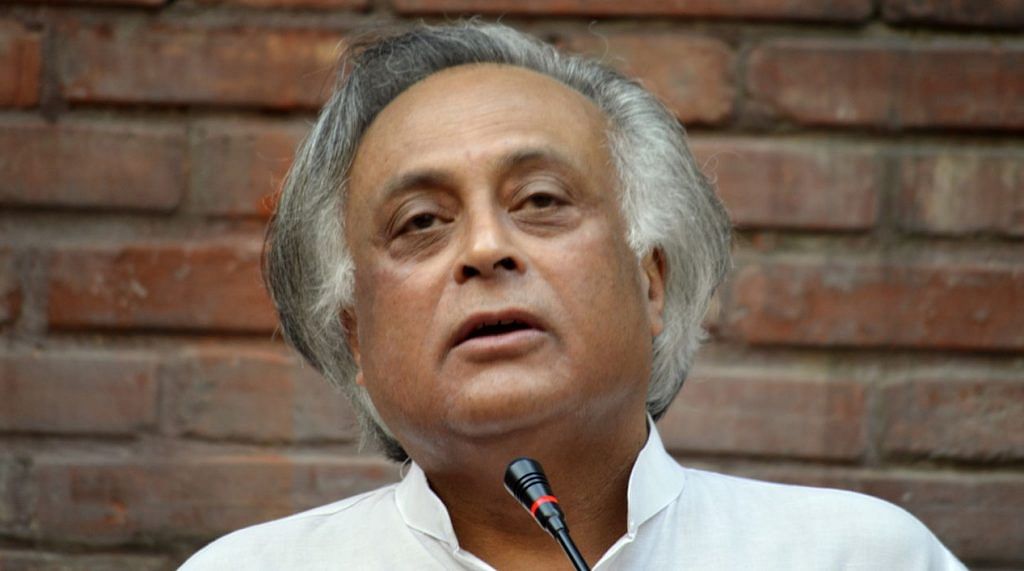Jairam Ramesh says he doesn’t consider the year-end assembly polls in five states as a semi-final before the 2019 Lok Sabha elections.
New Delhi: Congress strategist Jairam Ramesh believes the Lok Sabha elections next year will be between “parties and ideologies” and not between individuals, as he dismissed suggestions about the polls being a direct contest between party president Rahul Gandhi and Prime Minister Narendra Modi.
Speaking to ThePrint Friday, Ramesh also said the Congress does not look at the forthcoming assembly elections in five states as a semi-final ahead of the general elections.
Ramesh was recently appointed convenor of Congress’ core group that has been entrusted with the task of coordination and strategy-making for the Lok Sabha polls.
It’s BJP vs Congress
Stating that Indian politics is not about individuals but parties, Ramesh said 2019 will not be a ‘Modi vs Rahul’ battle but a fight between the Bharatiya Janata Party and the Congress.
“I have always believed and I continue to believe Indian elections are not personality contests but they are battle of political parties. Political parties are at the foundation of our democratic system,” said Ramesh.
“So it is really the party, the party organisation, the party symbol, the party mobilisation that provides the bulk of the support during the election times.”
He added, “Having said this, obviously, parties are led by people. Obviously, individuals matter, leadership matters, projection of individual matters.”
Although Ramesh said that the BJP got 7-8% more votes in 2014 due to the Modi factor, he maintained the base of the Indian political system is that of the party.
“I think the fundamental difference is we are not a presidential form of government. We are a party-led parliamentary system in which parties compete, and I know elections after elections in different parts of the country people vote for parties,” he said.
“In 2014 there is evidence to show that the BJP got an additional 7 or 8 per cent of the votes because of the individual. I am not denying that. But the base of the political system is that of the party,” said Ramesh.
“The media would like to portray it as A versus B but I think the voter deserves a better choice of party A or party B. Ideology A or B.”
‘Not on back foot’
The Congress leader who played an important role in formulating the party’s strategy to return to power in 2004 said the 2019 elections would be “challenging but we are not on the back foot”.
Also read: The real 2019 fight isn’t between Rahul Gandhi and Narendra Modi
“We are confronted with Mr. Modi and Mr Shah who have unlimited resources at their command and they also have the machinery of the government and the agencies, which they are using for devastating effect,” said Ramesh.
“But over the last four years reality bites have become evident — the gap between what Mr. Modi promised and what he has delivered, the gap between what Mr. Modi is claiming and what he is delivering. This is becoming increasingly evident.”
“Now, wherever I go people who voted for Mr. Modi enthusiastically in 2014 for whatever reasons are disappointed, disenchanted, disillusioned. Now our challenge is to convert that disappointment, disenchantment and disillusionment into electoral support,” he said.
“We saw this in Gujarat where, psychologically, the BJP didn’t cross the three digit mark which was a huge, huge political setback for them. Of course, we should have done better in Gujarat,” he added.
Assembly elections
Ramesh said he doesn’t agree with the characterisation of the state assembly elections as semi-finals.
“In 2004, people were using the same words, like semi-finals. We got decimated in Chhattisgarh, Madhya Pradesh and Rajasthan (in 2003 assembly elections)… six months later we were in power (at the Centre). So what sort of a semi-final was that?” said Ramesh.
Also read: Jairam Ramesh, Rajeev Gowda and Pawan Khera to lead Congress panels formed for 2019 polls
“Assembly polls have their own logic, their own dynamic and their own set of issues. At the same time, parliamentary polls have a completely different dynamics altogether,” he said.
To reiterate his point, Ramesh cited the example of the assembly elections in four states in 1998, when Prime Minister Atal Bihari Vajpayee couldn’t ride the nuclear tests wave and Congress won.
“I am just saying things change very rapidly and, frankly, my experience of two-and-a-half decade is that it’s very unwise to extrapolate from state level to the national level,” said the Congress leader.
‘No soft Hindutva’
Ramesh also dismissed the charge that Gandhi has been indulging in “temple-hopping” to counter the push by the Rashtriya Swayamsevak Sangh and Amit Shah for building the Ram temple in Ayodhya.
“I don’t understand what you mean and how this is temple hopping. He goes to different places of worship depending on the place or area he is in,” said Ramesh.
Also read: Dear Rahul, soft Hinduism can be a winner, but not with soft nationalism
“It is a private belief, private faith. If he decides to go and visit a temple what’s wrong in it? Or if he decides to go to a mosque or Gurudwara.”
Ramesh added, “This soft Hindutva, I’m afraid, is a completely bogus phrase invented by the media. What is soft Hinudtva? I fail to understand this.”
